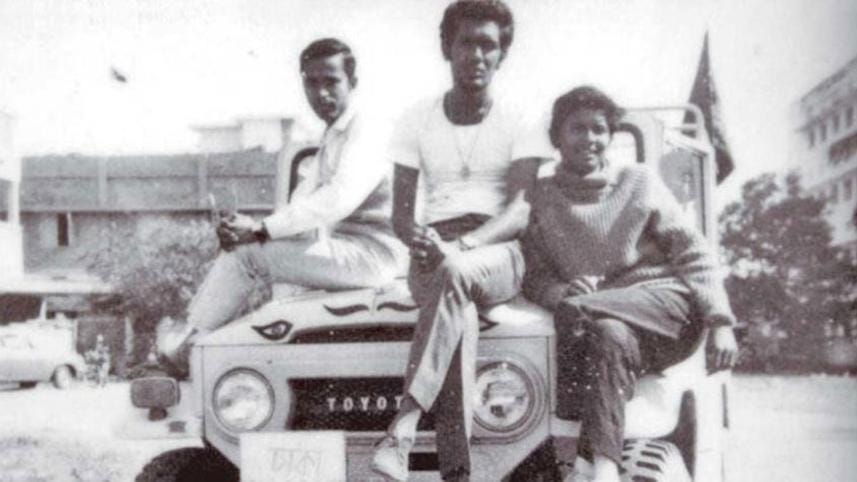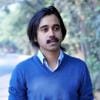Destroyed, but not defeated

It is said that in times of peace, sons bury their fathers, but in war, it is the fathers who bury their sons. On August 29, 1971, the Pakistani army caught Bodiul Alam (Bodi), Shafi Imam (Rumi), Abdul Halim Chowdhury (Jewel) and Magfar Ahmed Chowdhury (Azad) in Dhaka city. They were the members of a guerrilla unit of Mukti Bahini.
Rumi's parents and Azad's mother witnessed the extremely distressing scenes of the capture of their sons. Blood poured out of Azad's nose and mouth as the Pakistani soldiers beat him up mercilessly in front of his mother. Eminent musician Altaf Mahmud was also captured by the Pakistani army at the dawn of August 30. Before his family members, the Pakistani soldiers hit him hard with rifle butts. The blow broke one of his front teeth. Sharp strokes of the bayonet caused a cut on his forehead and the skin started hanging over his eyebrows. Rumi and Azad never returned to their mothers; neither did Bodi and Jewel. Altaf Mahmud's wife and daughter never saw him again.
From June 1971, Bengali guerrillas started conducting operations in the heart of Dhaka city. As they were locals of Dhaka, they knew the city very well. Most of them were students and trained in Sector 2, which was under the command of the then Lieutenant Colonel Khaled Mosharraf. Their operations had multiple aims—to let the world know that the situation in Bangladesh, especially in Dhaka, was far from stable, to unnerve and demoralise the Pakistani army, and to instill hope and courage in the Bengali population eager to see the independence of Bangladesh. Habibul Alam, Kazi Kamaluddin, Qamrul Huq (Shawpon), Ali Ahmed Ziauddin, Mofazzal Hosen Chowdhury (Maya), Golam Dastagir Gazi, AFMA Harris, Fateh Ali Chowdhury, Masud Sadique (Chullu), Pulu, Mukhtar and some other guerrillas took part in several daring operations in Dhaka from June 9 to August 29, 1971.
Bodi showed extraordinary courage in some important guerrilla actions. On August 19, some guerrillas used two boats for a reconnaissance of Siddhirganj power station in Narayanganj. One of these boats bumped into a Pakistani army patrol boat. When the guerrillas were challenged by the Pakistani soldiers, Bodi quickly fired his Sten gun on the soldiers, emptying the whole magazine. Because of this rapid burst of fire by Bodi, the Pakistani soldiers could not retaliate much and with the exception of Jewel, the freedom fighters remained unhurt. On August 29, Bodi was the first to be arrested by the Pakistani army from a friend's house around 11 am. It is likely that Bodi was arrested after a tip-off. Otherwise, the Pakistani army had no other way of knowing he was a freedom fighter and that he would be in that specific house at that time.
Bodi was tortured brutally by the Pakistani army into giving them information about the other guerrillas, their arms and ammunition, and their hideouts. After the gruesome torture, Bodi disclosed the names of Chullu and Samad. Both of them were soon arrested. From Samad, the army figured out the association of Altaf Mahmud with the guerrillas. Altaf Mahmud, a much-loved musician who achieved enormous fame after composing the tune of the iconic song Amar Bhai er Rokte Rangano Ekushey February, was very supportive of the guerrillas. Taking huge risks, he kept two steel trunks filled with arms and ammunition to be used by the freedom fighters in his house in Rajarbagh.
The trunks were buried under a lemon tree in the backyard. The Pakistani army made Altaf Mahmud dig out those trunks. Weapons and explosives were also hidden in an underground storage in the kitchen of the house of Habibul Alam in Dilu Road. Breaking the concrete slabs of the kitchen floor, the army collected those arms and ammunitions too. On August 29, Kazi Kamal and Shawpon narrowly escaped being captured during the army raids. Kazi and Jewel were in Azad's house in Moghbazar on that night. Three fingers of Jewel's left hand were still bandaged as they were badly injured ten days ago during the guerrillas' exchange of fire with the Pakistani army near Siddhirganj power station. Seeing the bandage on Jewel's hand, a Pakistani military officer twisted his injured fingers forcefully. Jewel screamed in terrible pain. Kazi instantly jumped on the army officer and snatched the officer's sub-machine gun. Then, he opened fire on the stunned Pakistani soldiers and ran away from the place.
Shawpon managed to hide himself inside the haystack near a cowshed when the Pakistani army surrounded his house in Malibagh. The soldiers searched the place thoroughly, but Shawpon was very lucky that maybe after seeing the cows, they did not go near the haystack. Jahanara Imam wrote in Ekattorer Dinguli that early in the morning of August 30, Shawpon came to their house in Elephant Road. When Jahanara Imam informed him of the Pakistani army's raids and asked him to go to a safe place immediately, Shawpon was so distraught that he could not even tell Rumi's mother that their house had also been raided last night. He just departed silently. On that morning, guerrillas Zia and Fateh also went to that house to inform Rumi of the danger. But it was too late.
Rumi joined the Liberation War in the middle of June. He was one of the specially trained guerrillas of Sector 2. During the operation in Dhanmondi on August 25, when the car carrying guerrillas was chased by Pakistani military vehicles, using his Sten gun butt, Rumi smashed the back windshield of the car of his own accord and opened fire on the military vehicle. Bullets fired by Rumi did not miss the driver and the jeep crashed into a lamp post. In 1971, Rumi was only 20 and a freshman in university. Because of the treachery of one or more local collaborators of the Pakistani army, these freedom fighters and talented individuals, who were deeply committed to liberating their motherland, were captured by the occupying Pakistani forces at the end of August 1971.
Although the guerrilla activity in Dhaka city suffered a major setback because of the capture of some skilled guerrillas and the loss of a large amount of arms and ammunition, the guerrillas did not get demoralised. Soon, new guerrilla groups from Sector 2, equipped with better arms and ammunition, entered Dhaka and from October 1971, guerrilla operations started to rock the capital again. In Sector 2, the then Major ATM Hyder put in a great deal of effort into training the young civilians to become skillful guerrillas. Major Hyder was a former officer of the Special Services Group (SSG), the elite commando unit of the Pakistan army. His specialised knowledge about commando-type guerrilla warfare and the dedication and determination of the young men contributed to the creation of daring guerrilla units.
Quoting Mao Tse Tung, Khaled Mosharraf once said to the young men aspiring to become freedom fighters that no government wants an alive guerrilla. Humayun Ahmed's important novel Aguner Parashmoni is based on the guerrilla activity in Dhaka in 1971. The novel ends with saying that as the dawn is breaking, the fireflies are not seen anymore. The fireflies are not needed. These sentences symbolically suggest the lack of interest among many people in independent Bangladesh in remembering the invaluable contributions of the freedom fighters in 1971. Do the majority members of the new generation even know the names of the young guerrillas of our Liberation War? Are they able to recognise one of those valiant guerrillas if their photographs are shown to them?
Failure to distinguish between real heroes and pseudo-heroes only serves to create an intellectual vacuum and historical ignorance in society. Rumi, Bodi, Jewel, Azad, Altaf Mahmud and many other freedom fighters were killed in 1971, but they were far from defeated. Although they did not live to see freedom, the glory of their courage and sacrifice will last forever. Let those fearless freedom fighters stand as examples to all of us. Let their courage and love for the motherland inspire the people of this country.
Dr Naadir Junaid is Professor at the Department of Mass Communication and Journalism, University of Dhaka.

 For all latest news, follow The Daily Star's Google News channel.
For all latest news, follow The Daily Star's Google News channel.
Comments